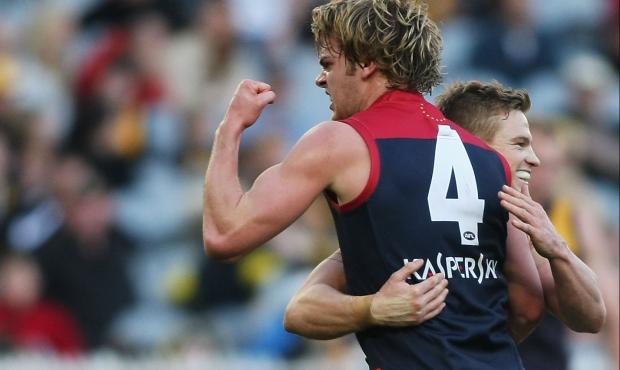Often at Melbourne, it's either Colin Sylvia or Jack Watts.
This week, after the 148-point loss to Essendon, it was both.
Sylvia was starved of opportunities early playing deep forward, then could not impact the game when sent into the midfield late.
Unfortunately, Sylvia's performance seemed to confirm his reputation of performing better when Melbourne wins but not when it loses.
He knows the score after 140 games (and just 46 wins) and his words to AFL.com.au after last season indicated his attitude. "Talk is cheap," he said.
Watts was sick against the Bombers, and was then subbed. He had a good pre-season but has had a surprisingly poor start to the premiership year.
Measures of Sylvia's workrate on Saturday night suggested he was trying hard, covering the ground and engaging in enough quick running to gain a pass mark for effort.
Sometimes, of course, such measures can be misleading, indicating a player is starting their journey to the football or into space just a split-second behind their opponent.
They run the same distance at the same rate but they don't get to the ball first.
It paints a picture of someone labouring when the reality is they are being reactive, second-guessing or overthinking the situation at hand.
That's why one opposition assistant coach suggested Sylvia should have a challenge put to him in round three: to run with the Eagles' best midfielder.
"You're one of the better players and a leader, but you're opposed to (Matt) Priddis this week," he said.
Watts on the other hand appears to have lost self-belief.
He needs to understand many have faith in him.
Those in the football department use only three words when asked about Watts: "He can play".
Whether he believes that himself only he can answer but he's done enough to suggest he can.
So now the question is, how do you restart Watts and Sylvia's stalled engines?

Jack Watts and Colin Sylvia celebrate a goal in 2011. Picture: AFL Media
He said three or four weeks at a lower level can transform a quality player into someone completely different to the player they were before being dropped. The game, said the coach, can often seem easier after that break.
Asking players to focus on what they can do for the team – blocking, chasing or outnumbering for example – rather than asking for individual outcomes is the first step forward, said another assistant coach.
Breaking the game down into simple aspects with simple measures of performance can build confidence.
A plan also needs to be put into place that allows them to work on specific strengths. Doing something about the situation is important rather than just thinking about it.
Whether that be focusing on marking or groundballs, it's about being active and losing yourself in that activity.
Former teammates may be engaged to give feedback that is honest and respected too. Lighten the mood. Have a laugh. Reprogram the brain. If Sylvia or Watts are feeling bleak then such action might be worthwhile.
All of the above are tactics opposition assistant coaches contacted by AFL.com.au say they use when a player's confidence drops.
The fear of failure needs to be removed. A positive mindset sees every step as part of the journey.
Sylvia is a good hunter of the ball and Watts reads the play well. They are their strengths. At the moment it appears as if those instincts are being overwhelmed by the effort to do the right thing.
In sport, sometimes one can try too hard.
Winning the ball is the most basic aspect of the game and Melbourne has not been doing that enough. Both are capable of doing that.
Everyone knows it would be easy for individuals to be weighed down by the focus, drained of energy and will.
Sylvia has played in just 46 wins in 140 games and Watts has enjoyed 16 wins in 57 matches.
Watts needs to enjoy the battle to be as good as he can be.
When Watts spoke to AFL.com.au in December he could feel a shift happening as he matured: "Early on you think 'how am I going to beat this guy', " Watts said. "'I'm 18 years old and he is 25, it is just unrealistic'. Then slowly your mindset changes."
Two games should not change that.
Sylvia should remember many players have played consistent football from 27 onwards after being inconsistent beforehand: former Magpie and Docker Chris Tarrant springs to mind.
They are at the door. Finding the key is not always easy.


